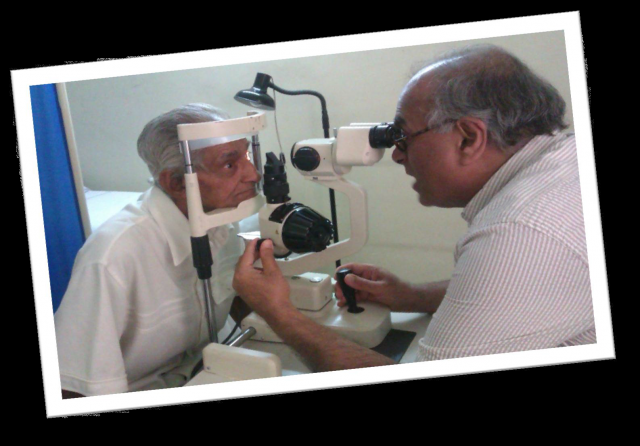Canadian Ophthalmologist Contributes Expertise to Improve Eye Health in Pakistan
Posted on Tuesday, 19 January 2016

Volunteer Name: Dr. Naushad Hussein
Location: Pakistan
Duration of Assignment: 1 week, September 2013
Task:
- Met with Dr. Zafar Ahmad (Lead, Aga Khan Health Services Pakistan - AKHSP) and Dr. Mahboob Hussain (Chief Ophthalmologist, Government Hospital, Chitral) to discuss opportunities to develop a sustainable and long term cataract surgery program for communities in Chitral.
- Participated in joint eye consultation clinics with Dr. Hafiz Ilyas at AKHSP Health Centers in Rawalpindi and Islamabad.
- Reviewed opportunities with local AKHSP leadership to develop 'Preventive Primary and Secondary' eye care services for the AKHSP Health Centers in Islamabad, Punjab and Khyber Pakhtunkhwa (PK).
Impact Made:
- Screened 56 patients in Rawalpindi and 140 patients in Islamabad through a joint eye consultation program for complex cases
- Discussed options with senior local AKHSP leadership for the establishment of long term, high quality, cost-effective, sustainable and comprehensive eye care services. Offered input to stakeholders for development of a long-term strategy for this growing community need.
FULL STORY
According to the World Health Organization’s August 2014 report on ‘Visual impairment and blindness’, about 90% of the 285 million people who are blind live in low income settings. For those with visual impairment, 80% of issues could be prevented or corrected if timely and appropriate treatment was initiated at the first sign of an emerging eye problem. In Pakistan, a National Blindness and Visual Impairment survey found that blindness prevalence was the highest in the provinces of Punjab and Baluchistan and lowest in the Khyber Pakhtunkhwa (KP) region.
Eye health is integral to the quality of an individual’s life and eye care services are now considered part of a comprehensive health care program. As a result, Aga Khan Health Services Pakistan (AKHSP) wanted to explore opportunities to further develop sustainable and comprehensive eye care services for the communities it serves through partnerships with local stakeholders. To understand these opportunities, Dr. Naushad Hussein, an ophthalmologist from Canada went to Pakistan in September 2013 to assist AKHSP. Naushad shared the experience he had gained since the 1990s about eye care service models in Northern Areas, Chitral & Badakshan (Tajikistan & Afghanistan) with local stake holders and jointly explored sustainable service models for the future. He worked closely with Dr. Zafar Ahmad (AKHSP Lead), Dr. Mahboob Hussain (Chief Ophthalmologist, Government Hospital, Chitral) and Dr. Hafiz Ilyas (Ophthalmologist, AKHSP Health Centers) during this visit.
In a joint consultative process with Dr. Hafiz, 56 complex patient cases were reviewed at the Rawalpindi Family Health Center and 140 complex patient cases were reviewed at the Islamabad AKHSP Family Health Centre. Lessons learnt from these encounters revealed that 90% had compound primary and secondary eye care issues and most patients desired a second opinion on their eye health. The issues were prevalent due to lack of awareness about eye health, limited comprehensive and standardized eye care services, a lack of resources to develop and maintain quality services and limited high impact technology to assist with eye care.
Despite these challenges, Naushad was inspired by the number of committed individuals who wanted to improve the general health and eye care of the communities they served. He was able to speak with the leaders of various institutions such as the Chief Ophthalmologist of Chitral Government Hospital and the CEO of AKHSP, Chitral (PK) to review the current services provided in the region and how they envisioned eye care being developed to support future community needs. Guiding principles of their discussions were cost effective best practices, high impact technologies and building local capacity. In addition, a two day brainstorming session was organized where these ideas were further explored to plan and develop model(s) for high quality, cost effective eye care services that would be sustainable in the local environment and context.
For Naushad, who had a desire to contribute his experience and knowledge, the opportunity was a real privilege. He was able to engage with host colleagues, while listening, learning and jointly developing health care models for a complex environment with limited resources.
The type of experience that Naushad gained also adds to Canada's wealth of knowledge because it exposes professionals to development work for complex health situations in underserved regions of the world. This global health experience is also highly valued by Canadian health colleagues, professionals, institutions, industries and businesses. Naushad believes that the model of volunteers acting as consultants and working with host institution colleagues offers a unique and humbling opportunity to engage, learn, contribute and work together to develop local capacities - both in host countries and in Canada. Naushad’s exceptionally valuable contribution on this assignment, for a health care program that is a critical priority in Pakistan, has been highly appreciated by AKHSP.